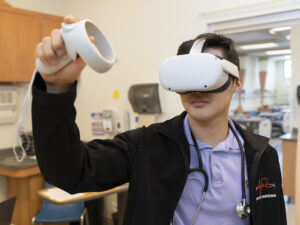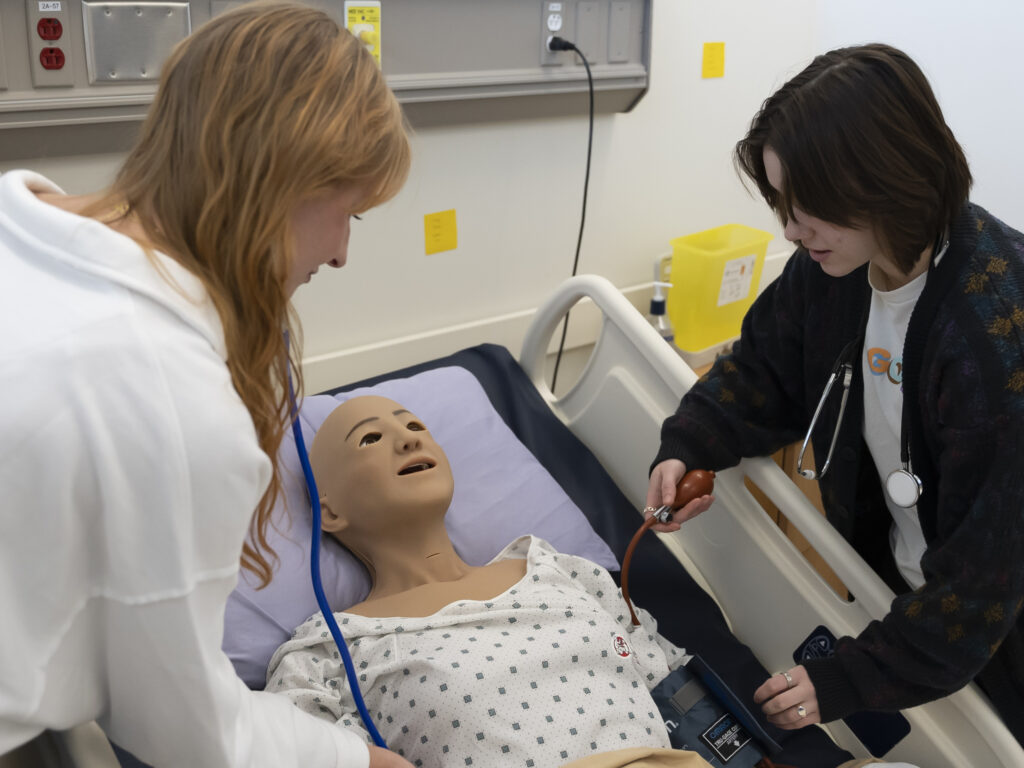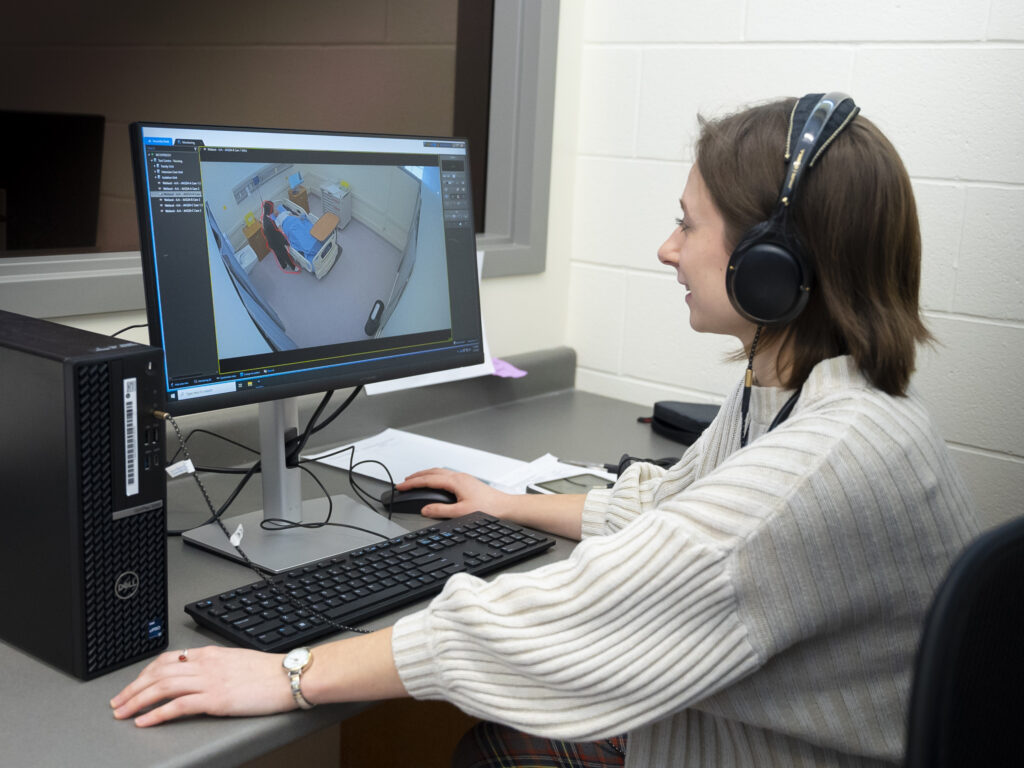Could virtual reality be the key to boosting a nursing student’s confidence?
A nursing research study, which launched at the College’s Applied Health Institute in March, seeks to identify ways to help nursing students feel more confident before skills tests or before they enter clinical settings, by comparing traditional methods and concept mapping with the use of virtual reality.
Led by Professor of Nursing Dr. Holldrid Odreman (PhD, MScN-Ed, RN, CCNE, CCSNE), the research study, which involves students from the College’s Practical Nursing program, is called, ‘From Pre-briefing to Skills Performance: Approaches that support Psychological Safety and Clinical Reasoning in Nursing Students.’
“The objective behind this study is to promote psychological safety in nursing students so they may have an increased chance of performing better. In addition, the goal is to identify which method of simulation instruction increases student performance and confidence as they make clinical decisions,” said Dr. Odreman.
“The goal of the nursing program is to ensure that we prepare nursing students so they can make good decisions for their patients. By extension, this study will help inform the teaching practice of clinical faculty, which will translate to better learning outcomes in the real clinical setting.”
Dr. Odreman noted that he had been interested in the subject for a long time, and the announcement of the Dream Big funding was an opportunity to make a research study happen.
“I’ve tried different ways, different methods, and it’s not so much about one specific method, it’s about having the right ingredients in the overall outcome,” said Dr. Odreman.
“I knew that one day I could test different simulation instruction methods together and observe their influence on students’ performance with clinical reasoning and decision-making. And so when I heard about the Dream Big Fund at the beginning of the term, I thought it was a perfect opportunity to pursue this study.”
This study is supported by $20,000 in Dream Big funding which covered the purchase of virtual reality equipment (Oculus headsets), to use with a nursing simulation program, as well as payment for student Research Assistants.
“It was very encouraging to receive the Dream Big funding,” said Dr. Odreman. “This funding is key evidence that our administration is serious about student success.”
Three consolidating Practical Nursing students from NC – Lauren Adamson, Tasha Labrie and Marissa Riolino – have taken on the roles of research assistants for the study, along with Ryan McNally, a Nursing student from Brock University.

Research Assistant Ryan McNally demonstrates the VR headset and hand controllers used in the study.
Working with Dr. Odreman, the research assistants began planning the study in January.
Research Assistants set out to examine the use of three different types of pre-briefing strategies – traditional, concept-mapping, and virtual reality – to determine which method the student participants were most comfortable using, encouraged their feeling of psychological safety, and influenced their ability to make appropriate clinical decision-making.
During the first week of March, they started collecting data. Each research assistant was assigned to focus on one of the pre-briefing strategies (traditional, clinical mapping or virtual reality) and determine which strategy helped increase psychological safety and clinical reasoning during the study.
What they’re doing
Thirty-eight Practical Nursing students volunteered to participate in this study. The participants were randomly assigned to one of the three types of pre-briefing strategies to receive the pre-briefing session before participating in a simulation skills scenario. Each pre-briefing session lasted 20 minutes. Following the session, participants completed a survey on Psychological Safety.
Once a pre-briefing session in their assigned group was completed, research assistants guided study participants through a simulation skills scenario where they were asked to use their nursing judgement to assess the patient.
Following ‘intervention week,’ Research Assistants began to analyze the data, dissect the research findings, and provide feedback to parties involved.
The study will officially end at the end of March. They hope to present the analyzed results from this research study to the nursing Program Advisory Committee, the dean, associate dean, faculty, and support staff from the practical nursing program and at future conference events.
Student experience
‘Learning is not a one-size-fits-all approach’

Practical Nursing students Tasha Labrie and Lauren Adamson are gaining experience working as Research Assistants in a study that seeks to identify ways to help nursing students feel more confident before skills tests or before they enter clinical settings.
Practical Nursing student Lauren Adamson (Thorold) focused on the VR modality alongside Brock student Ryan McNally, using Ubism, an app which simulates a nursing environment and allows students to interact with a virtual patient.
By wearing an Oculus headset and using hand controllers, research participants can look at the patient – a sim in the College’s nursing lab – to see if they need nursing, medical or medication interventions and accomplish positive clinical outcomes like better breathing, use of virtual oxygen or the administration of a virtual medication.
Since many of the participants do not have enough experience in a clinical setting, the opportunity to assess a patient by incorporating VR may be helpful for their confidence and for gaining a better understanding of how to help patients promptly.
Adamson, who is currently consolidating on a medical unit in a Niagara Falls hospital, was interested in the opportunity to get involved at a college level, and to prepare for further education opportunities.
“It’s a really interesting study focused on improving nursing education which is incredibly important to the future of nursing,” she said. “I am really excited to see the results of the study and hopefully see some positive changes that all of us could say we were a part of.”
Adamson said she is learning a lot about how to conduct and be a part of a research study.
“I think this will be important as It will help decrease anxiety with nursing, allow students to use different techniques to help support their learning, and overall increase confidence with skills in the classroom which will help in the clinical setting,” she said.
McNally (Haldimand County), who is a fourth-year consolidation Nursing student at Brock and works in the Emergency Department at Greater Niagara General Hospital, noted that he needs to participate in research opportunities for his studies and felt the NC nursing research study led by Dr. Odreman would be a good fit, as it combines his interest in nursing and VR. He also felt it was a great opportunity to increase support for nursing students in general.
“I believe this study will help future nursing students because it’s the first step in showing that by supporting the student and offering them their preferred methodology of pre-brief, we can obtain better clinical outcomes by making them feel more confident,” said McNally.
Tasha Labrie (Vineland) appreciates the opportunity to apply her background in research methods from her university background in medical sociology, while learning many new aspects of research specific to the modality they used. She said she hopes to pursue nursing research someday.
“My role during the intervention week of our study was to facilitate the traditional pre-briefing one-on-one sessions. The clinical judgement and psychological safety results of the traditional pre-brief modality will be assessed and compared to the concept mapping and VR modalities,” she said. “I’m mostly just excited to get our assessment results back from the study so we can get a better look at which pre-briefing modalities yielded the most successful results for our participants!
“We can’t wait to have some good solid data to support adapting best approaches to nursing education moving forward.”
Labrie is currently completing her consolidation on the Medical Respirology Unit at the St. Catharines hospital. She hopes to complete her perioperative training next year and aims to work in OR and to complete her RN bridge in the near future.
Meantime, she looks forward to the research study results which, she believes will have a significant impact on future nursing students.
“By implementing new, evidence-based techniques like VR in nursing education, or by having options to use approaches tailored to individual learning styles, we believe students will both perform better in skills scenarios and ultimately in the clinical setting, and they will deal with far less stress and feeling of psychological danger than perhaps nursing students from the past have,” she said. “Our goal is a positive educational experience that pays off with positive skill performance outcomes.”
Marissa Riolino (Welland) said when Dr. Odreman came into their consolidation orientation for the program with the opportunity to be a part of the study, she was immediately interested in the possibility of being a part of a positive change within the program.
“Psychological safety is something that is beneficial to learners, generally. I wanted to be able to make a difference in the nursing program specifically,” she said.
As a Research Assistant, Riolino has taken charge of the concept mapping modality of pre-briefing. “I’m excited about the process in general, and it’s been a learning experience on our end as well,” she said. “Nursing is all about implementing an intervention and then reassessing how the intervention worked and what may need to be done for next time. I feel like research has similarities to nursing in this way.”
This is the first time Riolino has been formally involved in a research study, and she noted that it has been a great learning experience. She believes it will provide insights into how to better create psychologically safe learning spaces for students.
“I think it will help educational institutions understand that learning is not a one-size-fits-all approach. I think it will help give students better resources to feel more confident in the lab setting and take that confidence into the clinical setting,” said Riolino.
“I hope it sets a precedent for future nursing education that hopefully ripples into the healthcare industry in general.

Practical Nursing student Marissa RIolino has taken charge of the concept mapping modality of pre-briefing, as a Research Assistant for the study.
Dream Big
NC’s Dream Big Fund is designed to support and cultivate trailblazing ideas that align with key areas of focus in the College’s Strategic Plan, to boost capacity to take advantage of new opportunities, and to advance initiatives in areas including but not limited to:
- Student experience;
- Programs and services;
- Research and innovation;
- People and organizational development;
- Community partnerships
- Fundraising;
- Alumni relations;
- Learning enterprises;
- Experiential learning; and
- Co-curricular opportunities.
The Dream Big Fund is a $1-million fund that enables the College to more quickly approve pilot initiatives and activities that further one or more Strategic Plan objectives.
